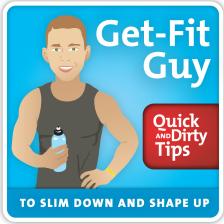What to Eat For Breakfast Before a Big Workout or Race: Part 1
In this episode, you’ll learn what to eat for breakfast before a big workout, marathon, triathlon, obstacle race, or any other event for which you need fuel without getting stomach problems.
Ben Greenfield
Listen
What to Eat For Breakfast Before a Big Workout or Race: Part 1
I remember the first time I thought about doing an Ironman Triathlon. In the early 2000s, I was watching the NBC Ironman coverage and remember witnessing some sleepy-eyed guy roll over a bit before 4 am to make his breakfast—a huge mash-up of oatmeal, fruit, toast and scrambled eggs. As he sat there hunched over in his pajamas jamming forkfuls of calories into his gaping maw, he motioned to a heaping pile of energy bars a few feet away, referring to that pile as “breakfast number two.”
At the time, I was a competitive bodybuilder, and not only used to eating 8-10 meals per day, but also well accustomed to planning out elaborate pre-competition rituals designed to enhance performance and blood flow to the muscles, including everything from extreme sodium loading and water depletion to dark chocolate, caffeine, and red wine back stage. So, the concept of waking up at the wee hours to shove fuel into the body certainly wasn’t a foreign concept.
But since then, over years of competing, studying, and coaching, I’ve learned that there’s a great deal more to a race morning breakfast than simply getting as many calories as possible into the body without puking. In this special two-part series, you’re going to learn how to truly crack the code on your pre-race meal (or a pre “big workout” meal), and how to never guess again if you find yourself wandering through the aisles of the grocery store the night before a marathon, a triathlon, or an obstacle race, or even if you’re navigating the continental breakfast section of your hotel a few hours before toeing the starting line.
Step 1: Size
Step one begins by figuring out the actual size of your meal. Should you eat everything in sight until you are 100% full? Should you painstakingly measure out each portion to the exact gram using a precise kitchen scale? Should you simply fast so your body magically “taps into its storage fat”?
The answer is: it depends. And it depends specifically on how big you are, how long your race is, and how much time you have to digest that meal. Armed with just a tiny dose of science, you can easily determine exactly how much you should eat.
Let’s begin with why you should consider eating in the first place. During an overnight fast, you’re not going to burn through much of your muscle storage carbohydrate (muscle glycogen). But your liver glycogen stores are reduced substantially while you sleep, with some studies reporting glycogenolysis (liver glycogen breakdown) rates of ~0.2–0.3 mmol glucosyl units per minute during the fast.
And while glucosyl units may mean diddly-squat to you, the big picture is that this equates to an approximate 80% reduction in your liver glycogen stores overnight. Since the average human liver stores about 400 calories of glycogen, this means that “topping off” those stores with around 320 calories is a good goal for the number of carbohydrates to include in your pre-race meal if it it’s before a race that threatens to exhaust your muscle and liver glycogen stores. In most people, it takes about 1.5-2 hours of hard racing to burn through your storage carbohydrate, so this means that for any race that goes longer than 1.5-2 hours, you should consider including approximately 320 calories of carbohydrates in your pre-race meal so that you can maximize glycogen storage. Of course, since you’ll be wandering around before the race, prepping your bike or your shoes or any other race equipment, warming up, nervously fidgeting and stretching in line at the porta-potty, you’re going to be burning an extra 100-150 calories of carbohydrate per hour, so it would be prudent to account for that as well.
Now, bear with me on the math. If you complete your pre-race meal 2 hours before the race start (a reasonable amount of time as you’ll shortly learn), then to maintain those precious glycogen stores, in addition to the 320 calories of carbohydrate, you need an extra 100-150 calories of carbohydrate for each hour leading up to the race, and this can be achieved by either consuming that equivalent of carbohydrate from a sport bottle by nursing a bottle of sports drink, etc., as you wait for the race to start, or by simply including those calories in your pre-race meal. Both methods work, but I specifically like to get most of it out of the way at once, then get a few extra calories in that last hour leading up to the race. Your gut can absorb around 240-280 calories of carbohydrate per hour, so this means that if you consume 320 + 150 calories of carbohydrates with breakfast 2 hours prior to the race that you’ll be able to easily digest that amount over those 2 hours, and still be able to throw in another 100-150 calorie “snack” in the final hour leading up to the race.
There are a few other quick nerdy things to note about carbohydrates. The first is that a lower glycemic index carbohydrate may cause a less rapid rise in blood glucose and give you more stable energy levels. Whole grains, barley, rye, rice, quinoa, oatmeal, grapefruits, apples, pears, sweet potatoes, and yams are all relatively low on the glycemic index. Next, eating two different types of carbohydrates—also known as multiple transportable carbohydrates—will allow you to absorb more carbohydrates. So, you can include, for example, a fructose sugar such as fruit or honey with a glucose sugar such as a potato. Finally, some of the modern “engineered” forms of carbohydrate that include a high molecular weight starch, such as UCAN Superstarch, can blunt the glycemic and insulin response to carbohydrates, and increase fat oxidation.

Is your head hurting yet? Probably! So, I’ll stop there. In the next episode, we’re going to delve into both fats and proteins, and even take into consideration the fact that some of what you learned in this article may actually be a “moot-point” if you’re someone who is fat adapted (e.g. someone who has gotten their body very, very good at conserving glycogen stores and operating well with lower levels of carbohydrate intake).
But until then, if you have questions about what you’ve learn so far, or what to eat for breakfast before a big workout or a race, then leave your thoughts over at the Facebook GetFitGuy page!
Image courtesy of Shutterstock.

